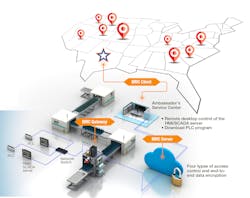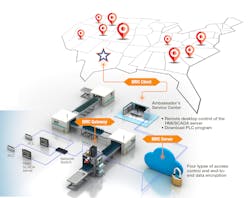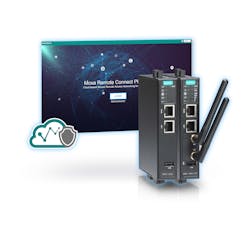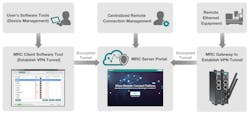Remote Access Solution Reduces Food Waste in Processing Plants
Food insecurity continues to be a pressing issue in the United States. Feeding America, a nationwide network of food banks, food pantries, and meal programs, reported that in 2020 about 42 million people, including 13 million children, lacked access to sufficient food for an active, healthy life.
One solution to food insecurity is to reduce waste in food manufacturing plants brought on by production downtime. According to the U.S. Environmental Protection Agency, in 2019 a staggering 40 million tons of food was wasted in the food and beverage processing sectors.
Food processing plants typically run their equipment for 16 to 20 hours a day. Unfortunately, downtime is an inevitable part of manufacturing operations. Recent surveys have shown that downtime can lead to a loss of at least 5% of production capacity for most sites, and sometimes take up to 20% of operational hours.
For food processors, downtime translates into increased operating costs, disruptions in the supply chain, and delays in food deliveries. Also, because the processing plants often handle delicate, time-critical products, a holdup in getting materials across production lines can cause raw materials to spoil, and bacterial growth to form on damaged machines, resulting in the disposal of whole batches of contaminated food if production cannot resume in time.
Facing Downtime in Dallas
For over a century, Dallas, Texas has been the hub of the food and beverage industry, home to over 15,000 food-related companies, including major players like Frito-Lay, Coca-Cola Southwest Beverages, and Dean Foods. Amid this rapidly evolving industry, Ambassador Controls & Engineering, an industrial engineering solution provider in Dallas, is revolutionizing food and beverage manufacturing by providing cutting-edge solutions incorporating digital transformation and automation. As the industry continues to advance, adopting new technology is crucial in shaping its future and reducing food waste.
Brian Msal, the Director of Engineering at Ambassador Controls, explained that the company typically serves as a Tier 1 partner to their customers, providing essential support for mission-critical production tasks. Msal emphasized the importance of efficient and prompt issue resolution in maintaining the company's frontline position as a technology partner.
“As a leading provider of support services to manufacturing sites, Ambassador Controls aims to expand its exceptional service support to over 10 manufacturing sites annually,” explained Msal. “However, permanently stationing professional personnel at each site is not a cost-effective option, posing a challenge in ensuring timely resolution during breakdowns.”
Remote Access Anytime, Anywhere
Ambassador Controls faced the challenge of providing timely support to customers across multiple manufacturing sites. To address this, Ambassador Controls partnered with Moxa to deploy a Moxa Remote Connect (MRC) secure remote access solution.
Moxa MRC gateways were installed onto manufacturing equipment panels at multiple customer sites, enabling easy and secure remote diagnostics, maintenance, and troubleshooting, regardless of the location or time zone. An MRC server was hosted on AWS, providing end-to-end secure tunnels between the MRC client and the machine behind the MRC gateway.
This setup lets Ambassador's engineers prioritize support, conduct preliminary troubleshooting, and offer real-time support to customers, creating a more streamlined and cost-efficient process. The VPN secure tunnel incorporated in the MRC solution also addresses concerns about customers' internal system security. By providing a safe and secure connection, customers no longer have to worry about unauthorized access.
Another unique feature of the MRC solution is its user-friendly interface, which enables both on-site manufacturing operators and Ambassador's engineers to access specified devices and connect to the MRC gateway easily with role-based control. This helps general operating personnel assist with system checks and troubleshooting, even during labor shortages.
Preventing Food Waste
By implementing a remote access solution, Ambassador's engineers can reduce the carbon footprint of traveling and solve manufacturing problems from their offices, making it easier to prioritize and serve customers efficiently from anywhere.
"Remote access service is the working standard we have nowadays and Moxa MRC facilitates that communication," said Msal. “Besides improving overall customer experiences, remote access contributes to sustainability by preserving more food, while minimizing machine downtime and operating losses.”
Since 2020, Ambassador has upgraded its service level through instant response using the Moxa MRC solution. Moxa's MRC revolutionized Ambassador Controls' response time, resulting in high levels of customer satisfaction. The previous day-long wait is now reduced to instantaneous access in emergencies, securing Ambassador Controls' position as a leader in industrial maintenance.



